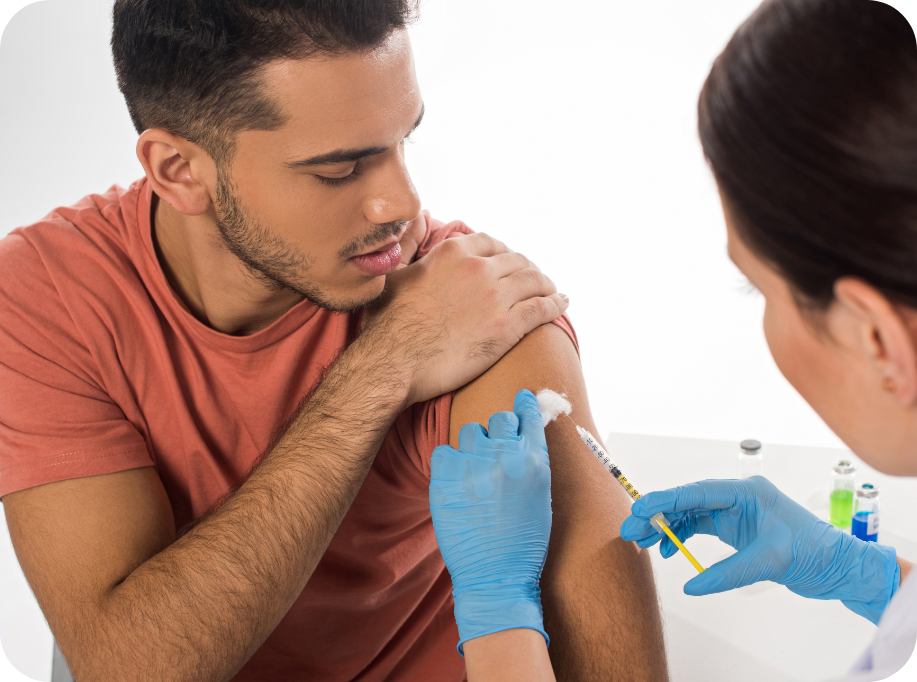
Biologic Therapy for Asthma and Allergy in New Jersey & New York
At Impact Medical, we utilize biologic therapies to treat allergy, asthma, and immunology conditions to offer relief to you.

At Impact Medical, we utilize biologic therapies to treat allergy, asthma, and immunology conditions to offer relief to you.

Biologic therapies in New Jersey and New York represent a relatively newer approach in managing different medical conditions. This is not unique to allergy, asthma, and immunology. Biologics have been used for asthma since Xolair was FDA approved in 2003. These therapies utilize recombinant DNA technology to produce antibodies that have very specific biological targets. Prior to prescribing a biologic, a patient will have certain biomarkers checked which can help predict who will respond to which biologic. If you haven’t responded positively to other asthma treatments, biologic therapies could help to relieve your symptoms.
By precisely addressing the underlying causes, biologic therapies in NJ and NY provide a very safe and more targeted approach. Allergy and asthma medical conditions that utilize biologics include:
Once your doctor has identified that you could be a potential candidate for biologic therapy New Jersey, New York, and surrounding areas, they will conduct a comprehensive assessment to identify specific inflammatory pathways contributing to your disease. Through detailed tests and evaluations, healthcare providers pinpoint the components that play a key role in your condition.

Following the assessment, your healthcare provider will select a biologic medication that precisely targets the identified pathways. Examples of biomarkers that help determine which biologic will be recommended include Total serum Immunoglobulin E (IGE) level, Absolute Eosinophil Count, Fractional Exhaled Nitric Oxide level, and Environmental allergy testing in NJ and NY. These medications, often administered through injections or infusions, work to modulate the immune response, effectively reducing inflammation associated with the underlying condition. These therapies provide a more targeted and effective solution compared to traditional medications.

Regular monitoring is the key to success for biologic therapies. Healthcare providers closely track the patient’s symptoms and overall response to the treatment. This allows for timely adjustments to the treatment plan, ensuring that the biologic therapy continues to provide optimal control for the patient.
Monoclonal antibody that binds to circulating IGE in the bloodstream. This prevents the binding of IGE to the high-affinity IGE Receptor (FcεRI) on the surface of allergy cells (mast cells and basophils), therefore limiting the release of mediators of the allergic response.
Xolair is indicated for the following medical conditions:
Moderate to Severe Allergic Asthma
Chronic Spontaneous Urticaria
Chronic Rhinosinusitis with Nasal Polyps
Dosing Frequency: Subcutaneous injection every 2-4 weeks
Monoclonal antibody that inhibits IL-4 and IL-13 signaling by specifically binding to the IL-4 receptor alpha subunit. This lessens allergic inflammation.
Dupixent is indicated for the following medical conditions:
Atopic Dermatitis
Moderate to Severe Asthma
Chronic Rhinosinusitis with Nasal Polyps
Eosinophilic Esophagitis
Prurigo Nodularis
Dosing Frequency: Subcutaneous injection every 1-4 weeks
Monoclonal antibody that specifically targets IL-5 and binds to it. This inhibits IL-5 signaling, reducing the production and survival of eosinophils. Eosinophils are one of the main inflammatory cells involved in allergic inflammation.
Nucala is indicated for the following medical conditions:
Severe Eosinophilic Asthma
Chronic Rhinosinusitis with Nasal Polyps
Eosinophilic Granulomatosis with Polyangiitis (EGPA)
Hypereosinophilic Syndrome (HES)
Dosing Frequency: Subcutaneous injection every 4 weeks.
Antibody that directly binds to the alpha subunit of the IL-5 receptor on eosinophils. This leads to programmed cell death or apoptosis of Eosinophils. Eosinophils are one of the main inflammatory cells involved in allergic inflammation.
Indicated for the following medical conditions:
Severe Eosinophilic Asthma
Dosing Frequency: Subcutaneous injection every 4 weeks X 3 doses, then every 8 weeks
Monoclonal antibody that specifically targets IL-5 and binds to it. This inhibits IL-5 signaling, reducing the production and survival of eosinophils. Eosinophils are one of the main inflammatory cells involved in allergic inflammation.
Indicated for the following medical conditions:
Severe Eosinophilic Asthma
Dosing Frequency: Intravenous infusion every 4 weeks
Monoclonal antibody that targets a protein called thymic stromal lymphopoietin (TSLP) which is a protein within the Alarmin cytokine family that initiates and perpetuates airway inflammation.
Tezspire is indicated for the following medical conditions:
Severe Persistent Asthma
Dosing Frequency: Subcutaneous injection every 4 weeks
Monoclonal antibody that targets IL-13. Inhibits IL-13 interaction with its receptor, thus preventing IL-13 induced inflammatory responses in the skin.
Indicated for the following medical conditions:
Moderate-to-severe Atopic Dermatitis
Dosing Frequency: Subcutaneous injection every 2-4 weeks
